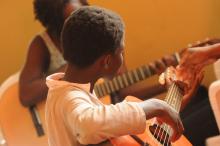LAB.2030 | How Recycling Waste Has Benefited the Local Communities
In recent years, recycling has become a prominent part of everyday life. Governments and companies are constantly looking for new ways to reduce environmental damage and drive sustainable living. However, despite these efforts, there is a vast amount of material waste and byproducts that currently cannot be efficiently recycled. With this in mind, The [Re]Verse Pitch Competition in Austin and the Engineering Creative Solutions to Global Challenges: Converting Waste to Energy in Paducah were two initiatives set up in order to combat this challenge. Both projects focus on giving waste products a value and developing them into something useful. By using local resources such as businesses and universities, the initiatives benefit from the creativity of the people around them and provide a platform enabling collaboration within the area. International partnerships are also crucial in the reduction of waste product and the creation of urban sustainability. Environmental damage is not specific to these two cities; it is a worldwide issue, especially in regards to plastic waste. The University of Kentucky College who organises the project in Paducah relies on international support to assist in the search for recycling methods that convert plastic into fuel. Although the solutions created meet local requirements, the link with international benefactors provides opportunities to circulate results from worldwide research projects, therefore helping the wider global community. As well as looking at the potential secondary use for plastics, the [Re]Verse Pitch Competition funds projects advocating the use of any byproduct material, from old records to bits of material. Its creative flare generates national and international interest, promoting new and innovative ways to recycle all around the world.





